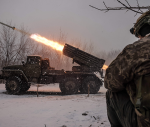You are here
Europe must lead Ukraine’s reconstruction
Aug 08,2023 - Last updated at Aug 08,2023
CAMBRIDGE — Who should pay for Ukraine’s postwar reconstruction? Shortly after Russia’s invasion, my co-authors and I estimated that it would cost roughly $220-550 billion to rebuild the country and called for Europe to spearhead the recovery effort. After more than 500 days of death and destruction, the projected costs have probably at least doubled. Consequently, the need for Europe to step up and assume responsibility has become increasingly urgent.
While the United States is also deeply invested in Ukraine’s future, as its massive economic and military support for the country has shown, there are several reasons why Europe must take the lead in coordinating and financing the country’s postwar recovery.
First, Europe’s interests are more closely aligned with Ukraine’s. While the US benefitted enormously from the fall of the Berlin Wall in 1989, European countries reaped far greater rewards. Similarly, Europe has more to lose from a return to the pre-war status quo, not to mention from the looming threat of nuclear escalation.
Second, Europeans must realise that even if US military support for Europe and Ukraine remains intact following the 2024 presidential election, a big “if”, given the current state of US politics, America’s enthusiasm for long-term financial support will likely fade, regardless of the outcome. Both Democrats and Republicans are increasingly embracing populist stances, and today’s populists focus mostly on domestic issues, with little concern for the rest of the world.
Third, the European Union has already granted Ukraine candidate status, thereby acknowledging that the country is an integral part of Europe and should be part of the bloc. Given that Ukraine will most likely require substantial technical assistance to improve its governance standards and meet the conditions for accession, the EU must do all it can to expedite this process.
Moreover, European countries have been free riding on America’s military expenditure for decades. The US currently spends twice as much as EU member states on national defense as a share of GDP. If the US could reduce its military budget to European levels, it would save roughly $400 billion annually. Conversely, if Europe raised spending to US levels, it would be spending at least $300 billion per year more, easily enough to pay for reconstructing Ukraine and much more. This amount would more than cover the EU’s portion of Ukraine’s postwar reconstruction.
Of course, we can only speculate whether Russian President Vladimir Putin would have refrained from attacking Ukraine had Europe bolstered its defensive capabilities. But a report by France’s national assembly in February, which suggests the country would exhaust its existing ammunition within weeks in the event of an intense armed conflict, does not inspire much confidence in European countries’ military readiness. While French President Emmanuel Macron has taken steps to increase defense spending, these measures merely seek to meet NATO’s threshold of 2 per cent of GDP.
Why does Europe spend so much less on its own defence than the US does? In their brilliant 1966 paper “An Economic Theory of Alliances,” economists Mancur Olson and Richard Zeckhauser argued that larger countries often bear a disproportionate share of the costs associated with actions that serve the common good. The paltry contributions of NATO’s smaller members are a case in point. A country like Canada, for example, spends only 1.3 per cent of GDP on defence because it knows that the US will shoulder much of the burden, rendering fluctuations in its modest defence budget relatively insignificant.
This theory is far from flawless: as this summer’s unprecedented wildfires have shown, the Canadian government does not want to spend much on fighting forest fires, either. But it does offer insight into why the US often ends up footing the bill for other countries’ national-defence needs.
Nevertheless, a recent report by the Kiel Institute for the World Economy underscored just how little some European countries, such as France, Italy, and Spain, have contributed to the Ukrainian war effort. While the EU has recently pledged to provide Ukraine with an additional 50 billion euros by 2027, only a third of this sum will be given as outright grants. The rest will be provided as loans that Ukraine will most likely be unable to repay.
To be sure, Ukraine’s reconstruction is a massive, costly undertaking whose success will depend on many factors, including Ukraine’s own commitment to pursuing necessary economic reforms. But European countries must come to terms with their historic responsibility to lead this effort, even if it means higher debt and slower growth for their own economies in the future.
Kenneth Rogoff, professor of Economics and Public Policy at Harvard University and recipient of the 2011 Deutsche Bank Prize in Financial Economics, was the chief economist of the International Monetary Fund from 2001 to 2003. He is co-author of “This Time is Different: Eight Centuries of Financial Folly” (Princeton University Press, 2011) and author of “The Curse of Cash” (Princeton University Press, 2016). Copyright: Project Syndicate, 2023.











